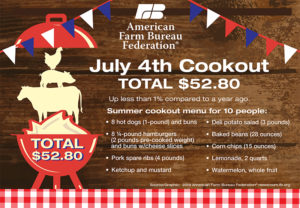 Americans will pay just slightly more to celebrate the Independence Day holiday with a traditional cookout.
Americans will pay just slightly more to celebrate the Independence Day holiday with a traditional cookout.
A cookout of Americans’ favorite foods for July 4th, including hot dogs, cheeseburgers, pork spare ribs, potato salad, baked beans, lemonade and watermelon, will cost just a few cents more this year, coming in at less than $6 per person, says the American Farm Bureau Federation. Farm Bureau’s informal survey reveals the average cost of a summer cookout for 10 people is $52.80, or $5.28 per person. The cost for the cookout is up just 11 cents (less than 1%) from last year.
“Strong consumer demand for beef and growth in U.S. meat production has led to higher ground beef prices but lower pork spare rib prices for the 4th of July,” said AFBF Chief Economist Dr. John Newton.
AFBF’s summer cookout menu for 10 people consists of hot dogs and buns, cheeseburgers and buns, pork spare ribs, deli potato salad, baked beans, corn chips, lemonade, ketchup, mustard and watermelon for dessert.
“Pork production in 2019 continues to increase compared to year-ago levels. Increased supplies and competition in the meat case at the grocery contributed to lower spare rib prices,” Newton said.
With milk production record-high in 2019 and cheese production increasing, consumers will see lower cheese prices this grilling season. New this year, AFBF tracked the average cost of 1.5 quarts of vanilla ice cream ($3.58). Including ice cream brings the total for the July 4th cookout to $56.38, which is still under $6 per person. A total of 114 Farm Bureau members in 34 states served as “volunteer shoppers,” checking retail prices for July 4th cookout foods at their local grocery stores for this informal survey. The July 4th cookout survey is part of the Farm Bureau marketbasket series, which also includes the popular annual Thanksgiving Dinner Cost Survey of common food staples Americans use to prepare meals at home. The year-to-year direction of the marketbasket survey tracks closely with the federal government’s Consumer Price Index report for food at home. Both the index and the marketbasket remain relatively flat compared to year-ago levels.
“Through the mid-1970s, farmers received about one-third of consumer food expenditures for food eaten at home and away from home. During 2017, farmers received approximately 14.6 cents of every food marketing dollar, according to the Agriculture Department’s revised Food Dollar Series. However, after accounting for the costs of production, U.S. farmers net 7.8 cents per food dollar,” Newton said.
As online grocery shopping continues to capture consumer interest, a survey of popular online grocery services reveals the 13 items included in the AFBF July 4th survey cost more than $70, 38% higher.
